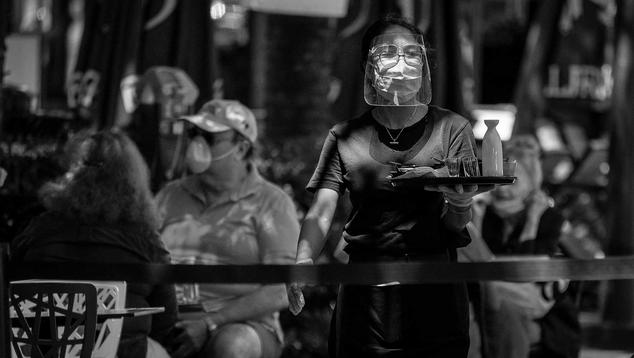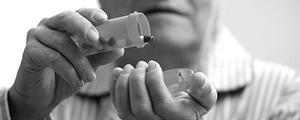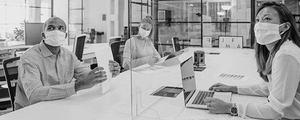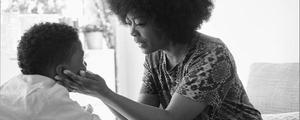Story Highlights
- 27% of Americans very confident they can protect themselves from COVID-19
- "Very confident" percentage has increased 16 points since early April
- 46% of Republicans very confident they can protect themselves
Editor's note: This story has been revised to include updated figures for June 8-21 for 18- to 44-year-olds, nonwhites, and Southern and Western residents, plus a revised Survey Methods section.
WASHINGTON, D.C. -- Though national concern about exposure to COVID-19 has remained largely steady since March, Americans are now reporting greater confidence in their ability to protect themselves from the coronavirus than in any prior Gallup survey. About one-quarter (27%) now say they are "very confident" that they can protect themselves, an increase of 16 percentage points from early April. Overall, 82% of respondents report they are at least "somewhat confident" that they will be able to avoid infection while in public.
| Mar 30-Apr 5 | Jun 8-21 | Change | |||||||||||||||||||||||||||||||||||||||||||||||||||||||||||||||||||||||||||||||||||||||||||||||||
|---|---|---|---|---|---|---|---|---|---|---|---|---|---|---|---|---|---|---|---|---|---|---|---|---|---|---|---|---|---|---|---|---|---|---|---|---|---|---|---|---|---|---|---|---|---|---|---|---|---|---|---|---|---|---|---|---|---|---|---|---|---|---|---|---|---|---|---|---|---|---|---|---|---|---|---|---|---|---|---|---|---|---|---|---|---|---|---|---|---|---|---|---|---|---|---|---|---|---|---|
| % | % | pct. pts. | |||||||||||||||||||||||||||||||||||||||||||||||||||||||||||||||||||||||||||||||||||||||||||||||||
| Very confident | 11 | 27 | +16 | ||||||||||||||||||||||||||||||||||||||||||||||||||||||||||||||||||||||||||||||||||||||||||||||||
| Somewhat confident | 52 | 55 | +3 | ||||||||||||||||||||||||||||||||||||||||||||||||||||||||||||||||||||||||||||||||||||||||||||||||
| Not too confident | 30 | 15 | -15 | ||||||||||||||||||||||||||||||||||||||||||||||||||||||||||||||||||||||||||||||||||||||||||||||||
| Not confident at all | 7 | 3 | -4 | ||||||||||||||||||||||||||||||||||||||||||||||||||||||||||||||||||||||||||||||||||||||||||||||||
| June 8-21 figures contain data from two surveys, conducted June 8-14 and June 15-21, 2020. | |||||||||||||||||||||||||||||||||||||||||||||||||||||||||||||||||||||||||||||||||||||||||||||||||||
| Gallup Panel, 2020 | |||||||||||||||||||||||||||||||||||||||||||||||||||||||||||||||||||||||||||||||||||||||||||||||||||
All demographic groups have grown more confident over this period. However, large gaps still exist in the levels of improved confidence between subgroups, particularly among political partisans. Since April 5, the percentage of very confident Republicans has risen 29 points, the largest shift of any demographic subgroup. There has also been a notable 18-point increase among independents, which is more than three times the increase among Democrats over that period.
In the wake of these shifts, Republicans (46%) are now more than four times as likely as Democrats (10%) to say they are very confident that they can protect themselves from infection, while independents (31%) are just over three times as likely.
| Mar 30-Apr 5 | Jun 8-21 | Change | ||||||||||||||||||||||||||||||||||||||||||||||||||||||||||||||||||||||||||||||||||||||||||||||||||
|---|---|---|---|---|---|---|---|---|---|---|---|---|---|---|---|---|---|---|---|---|---|---|---|---|---|---|---|---|---|---|---|---|---|---|---|---|---|---|---|---|---|---|---|---|---|---|---|---|---|---|---|---|---|---|---|---|---|---|---|---|---|---|---|---|---|---|---|---|---|---|---|---|---|---|---|---|---|---|---|---|---|---|---|---|---|---|---|---|---|---|---|---|---|---|---|---|---|---|---|---|
| % | % | pct. pts. | ||||||||||||||||||||||||||||||||||||||||||||||||||||||||||||||||||||||||||||||||||||||||||||||||||
| All U.S. adults | 11 | 27 | +16 | |||||||||||||||||||||||||||||||||||||||||||||||||||||||||||||||||||||||||||||||||||||||||||||||||
| Political party | ||||||||||||||||||||||||||||||||||||||||||||||||||||||||||||||||||||||||||||||||||||||||||||||||||||
| Democrat | 5 | 10 | +5 | |||||||||||||||||||||||||||||||||||||||||||||||||||||||||||||||||||||||||||||||||||||||||||||||||
| Independent | 13 | 31 | +18 | |||||||||||||||||||||||||||||||||||||||||||||||||||||||||||||||||||||||||||||||||||||||||||||||||
| Republican | 17 | 46 | +29 | |||||||||||||||||||||||||||||||||||||||||||||||||||||||||||||||||||||||||||||||||||||||||||||||||
| Gender | ||||||||||||||||||||||||||||||||||||||||||||||||||||||||||||||||||||||||||||||||||||||||||||||||||||
| Female | 10 | 21 | +11 | |||||||||||||||||||||||||||||||||||||||||||||||||||||||||||||||||||||||||||||||||||||||||||||||||
| Male | 12 | 34 | +22 | |||||||||||||||||||||||||||||||||||||||||||||||||||||||||||||||||||||||||||||||||||||||||||||||||
| Age | ||||||||||||||||||||||||||||||||||||||||||||||||||||||||||||||||||||||||||||||||||||||||||||||||||||
| 18-44 | 10 | 23 | +13 | |||||||||||||||||||||||||||||||||||||||||||||||||||||||||||||||||||||||||||||||||||||||||||||||||
| 45-64 | 14 | 33 | +19 | |||||||||||||||||||||||||||||||||||||||||||||||||||||||||||||||||||||||||||||||||||||||||||||||||
| 65+ | 9 | 27 | +18 | |||||||||||||||||||||||||||||||||||||||||||||||||||||||||||||||||||||||||||||||||||||||||||||||||
| Race/Ethnicity | ||||||||||||||||||||||||||||||||||||||||||||||||||||||||||||||||||||||||||||||||||||||||||||||||||||
| Nonwhite | 13 | 25 | +12 | |||||||||||||||||||||||||||||||||||||||||||||||||||||||||||||||||||||||||||||||||||||||||||||||||
| White | 10 | 28 | +18 | |||||||||||||||||||||||||||||||||||||||||||||||||||||||||||||||||||||||||||||||||||||||||||||||||
| Region | ||||||||||||||||||||||||||||||||||||||||||||||||||||||||||||||||||||||||||||||||||||||||||||||||||||
| Northeast | 11 | 26 | +15 | |||||||||||||||||||||||||||||||||||||||||||||||||||||||||||||||||||||||||||||||||||||||||||||||||
| Midwest | 9 | 28 | +19 | |||||||||||||||||||||||||||||||||||||||||||||||||||||||||||||||||||||||||||||||||||||||||||||||||
| South | 11 | 26 | +15 | |||||||||||||||||||||||||||||||||||||||||||||||||||||||||||||||||||||||||||||||||||||||||||||||||
| West | 12 | 28 | +16 | |||||||||||||||||||||||||||||||||||||||||||||||||||||||||||||||||||||||||||||||||||||||||||||||||
| June 8-21 figures contain data from two surveys, conducted June 8-14 and June 15-21, 2020 | ||||||||||||||||||||||||||||||||||||||||||||||||||||||||||||||||||||||||||||||||||||||||||||||||||||
| Gallup Panel, 2020 | ||||||||||||||||||||||||||||||||||||||||||||||||||||||||||||||||||||||||||||||||||||||||||||||||||||
In addition to party identification, there is now a 13-point gap between men (34%) and women (21%) in the percentage very confident, as men have increased in confidence at twice the rate of women since April. There is also a growing disparity in confidence among age groups: 18- to 44-year-olds (23%) are less confident that they will be able to protect themselves than are 45- to 64-year-olds (33%) and those older than 65 (27%), despite evidence that Americans over the age of 40 contract COVID-19 at higher-than-average rates.
It also bears noting that while nonwhite Americans are disproportionately more likely than white Americans to contract coronavirus, both groups are similarly confident in their ability to protect themselves from infection. That said, the percentage of very confident white Americans has increased 18 points since early April, compared with a 12-point increase among minority Americans.
Learn more about how the Gallup Panel works.




